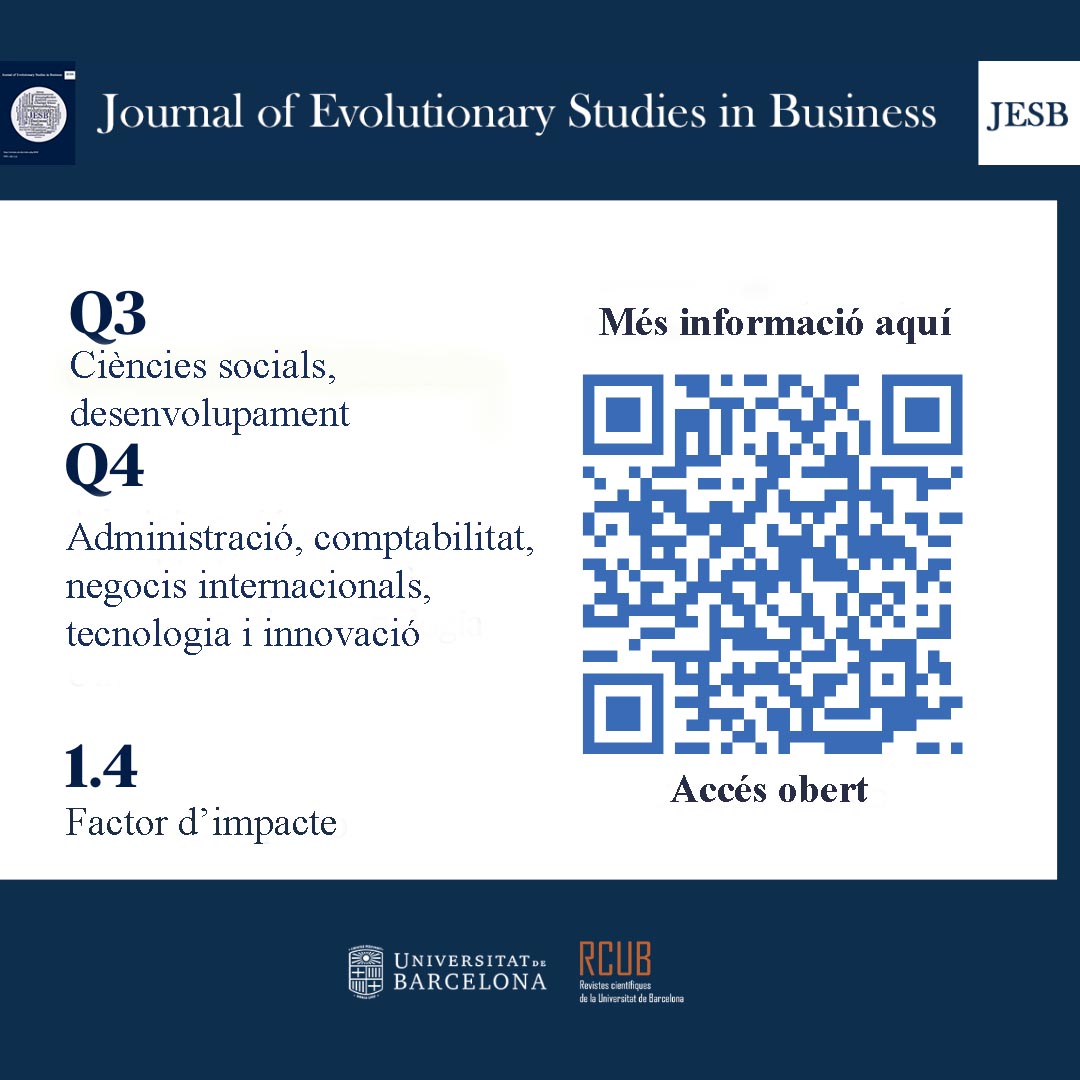The Role of History in International Business in Southern Europe
DOI:
https://doi.org/10.1344/jesb2016.2.j010Paraules clau:
International Business, Southern Europe, Joint Ventures, Alliances, MultinationalsResum
This article examines first of all two aspects of the increasing role of history in international business: history as a source of research methods and history as an underpinning for international business theory. Second, the authors present key themes related to international business in Southern Europe in the last two centuries, as analyzed in the other articles of the special issue devoted to this theme in this special issue of the Journal of Evolutionary Studies in Business.Descàrregues
Referències
Belich, James. 2009. Replenishing the Earth: The Settler Revolution and the Rise of the Angle-World 1783-1939. Oxford: Oxford University Press.
Bloch, Marc. 1954. The Historian’s Craft. Translated by Peter Putman. UK: Manchester University Press.
Buckley, Peter J. 2009. “Business History and International Business.” Business History 51 (3): 307-333.
Buckley, Peter J. 2011. “International Integration and Coordination in the Global Factory.” Management International Review 51 (2): 269-283.
Buckley, Peter J. (2016). “Historical Research Approaches to the Analysis of Internationalisation.” Management International Review 56 (5/6).
Buckley, Peter J., and Mark Casson. 1976. The Future of the Multinational Enterprise. London: Macmillan.
Buckley, Peter J., and Pervez N. Ghauri. 2004. “Globalisation, economic geography and the strategy of multinational enterprises.” Journal of International Business Studies 35 (2): 81-98.
Buckley, Peter J., and Donald R. Lessard. 2005. “Regaining the Edge for International Business Research.” Journal of International Business Studies 36 (6): 595-599.
Buckley, Peter J., C. L. Pass, and Kate Prescott. 1992. “The Internationalization of Service Firms: A Comparison with the Manufacturing Sector.” Scandinavian International Business 1 (1): 39-56.
Casson, Mark. 1987. The firm and the market: Studies on multinational enterprise and the scope of the firm. Oxford: Basil Blackwell.
Casson, Mark. 2009. The World’s First Railway System. Oxford: Oxford University Press.
Cairncross, Alexander K. 1953. Home and Foreign Investment 1870-1913. Cambridge: Cambridge University Press.
Chandler, Alfred D. 1984. “Comparative Business History.” In Enterprise and History: Essays in Honour of Charles Wilson, edited by D. C. Coleman and Peter Mathias, 3-26. Cambridge: Cambridge University press.
Chitu, Livia, Barry Eichengreen, and Arnaud J. Mehl. 2013. “History, Gravity and International Finance.” National Bureau of Economic Research Working paper 18697. Washington D.C.
Clark, Peter, and Michael Rowlinson. 2004. “The treatment of history in Organisation Studies: Towards an ‘Historic Turn’?” Business History 43 (3): 331-352.
Decker, Stephanie. 2013. “The silence of the archive: post-colonialism and the practice of historical reconstruction from archival evidence.” Management and Organisational History 22 (1): 27-48.
Dunning, John H. 2000. “The eclectic paradigm as an envelope for economic and business theories of the MNE.” International Business Review 9:163-90.
Dunning, John H. 2001. “The Eclectic (OLI) Paradigm of International Production: Past, Present and Future.” International Journal of the Economics of Business 8 (2): 173-90.
Easterlin, Richard A. 2013. “Cross Sections are History.” IZA, Discussion Paper 7341.
Fitzgerald, Robert. 2015. The Rise of the Global Company, Multinationals and the Making of the Modern World. Cambridge: Cambridge University Press.
Fogel, Robert W. 1964. Railroads and American Economic Growth: Essays in Econometric History. Baltimore, Maryland: The Johns Hopkins Press.
Freedman, Lawrence. 2013. Strategy. Oxford: Oxford University Press.
Jones, Geoffrey G. 1998. “Company History and Business History in the 1990s.” University of Reading Discussion Papers in Economics and Management (Series A). 383.
Jones, Geoffrey, and Tarun Khanna. 2006. Bringing History (Back) into International Business. Journal of International Business Studies 37 (4): 453-468.
Le Goff, Jaques. 1982. Time, work and culture in the Middle Age. Chicago: University of Chicago Press.
Ludden, David, ed. 2001. Reading Subaltern Studies: Critical History, Contested Meaning and the Globalization of South Asia. London: Anthem Press.
Mathews, John A. 2002. Dragon multinational: A new model for global growth. Oxford and New York: Oxford University Press.
Moss, Michael. 1997. “Archives, the Historian and the Future.” In Companion to Historiography, edited by Michael Bentley, 937-948. London: Routledge.
Pettigrew, Andrew M. 1997. “What is a processual analysis?” Scandinavian Journal of Management 13 (4): 337-348.
Reddaway, William B., S. J. Potter, and Christopher T. Taylor. 1968. Effects of UK Direct Investment Overseas: Final Report. Cambridge: Cambridge University Press.
Schwarzkopf, Stefan. 2012. “Why business historians need a constructive theory of the archive.” Business Archives 105 (November): 1-9.
Solzhenitsyn, Aleksandr. 1962. One day in the life of Ivan Denisovich. London: Sphere Books.
Strohm, Paul. 2014. The Poet’s Tale: Chaucer and the Year that Made the Canterbury Tales. London: Profile Books.
Steuer, Max David, et al. 1973. The Impact of Foreign Direct Investment on the U.K. London: HMSO.
Vernon, Raymond. 1966. “International trade and international investment in the product cycle.” Quarterly Journal of Economics 80 (2): 190-207.
Vernon, R. 1979. “The Product Cycle Hypothesis in a New International Environment.” Oxford Bulletin of Economics and Statistics 41 (4): 255-67.
Welch, Catherine, and Eriikka Paavilainen-Mäntymäki. 2014. “Putting Process (Back) In: Research on the Internationalization Process of the Firm.” International Journal of Management Reviews 16 (1): 2-23.
Zeitlin, Jonathan. 2007. “The Historical Alternatives Approach.” In The Oxford Handbook of Business History, edited by Geoffrey Jones and Jonathan Zeitlin, 120-140. Oxford: Oxford University Press.



